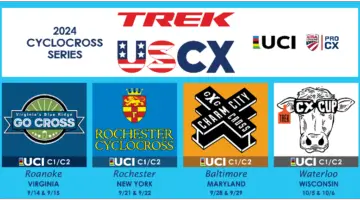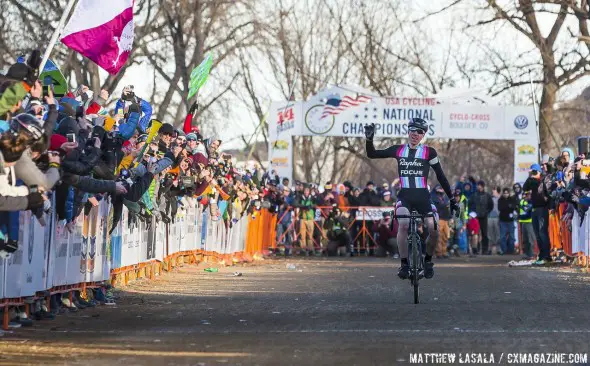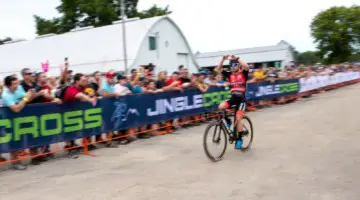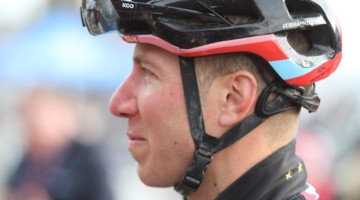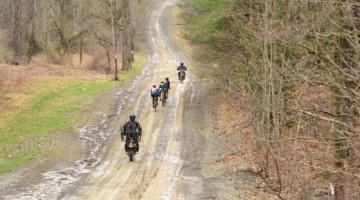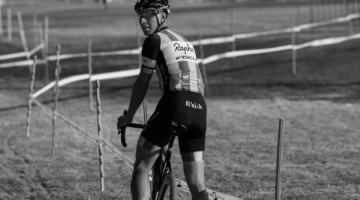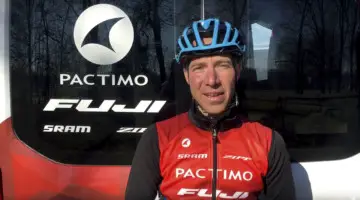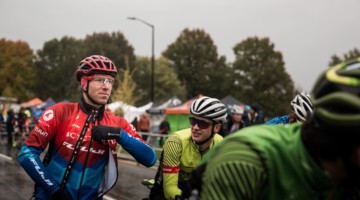After one hell of a season, Jeremy Powers is finally getting time off. Or at least, a little bit of time off the bike. As one of the first full-time ’crossers in the US, he won’t have to stress about the upcoming road or mountain bike season, though he might be showing up at a race or two to keep the dust off of his bikes. Still, he’ll be keeping busy between his training and getting ready for another season of Behind the Barriers TV. We caught up with the current National Champion to talk about his team for next year, his BTBtv and JAM Fund projects, training plans and how he keeps it all together.
Cyclocross Magazine: We haven’t caught up since Nationals!
Jeremy Powers: There wasn’t a lot to talk about after Nationals, honestly. Decent ride at the World Cup, but it was really challenging. Then it’s like, 13th, 19th, 17th, those are great results, let’s really put them on a cover…
CXM: So it wasn’t the season end you were hoping for?
JP: Well, everything is relative. It’s just a different thing over there. It’s a harder thing to conquer. I didn’t do many muddy races this year and every race there was muddy. There were some where three minutes of the lap, I was running. I don’t think I’ve ever done a race with that much running! But it was a good experience. It’s a challenge in a totally different way. They’re more well-rounded, and in the States, we’re less technical with more speed, and we tend to excel in places like the Czech with more speed.
CXM: Do you think you made the right call not going to Europe?
JP: I don’t think I would have had a shot at Nationals if I’d gone over and tried to do more World Cups. With everything I was doing and my race schedule, there would have been no chance. And with nationals being up there for me, I focused on that, and I got that. I was happy with it. I don’t think I would have had success with that if I’d tried to go to Europe.
CXM: Will you do a season over there?
JP: I have ambitions there, for sure. The team took a step back with how much it was going to focus on Europe though. That’s how it goes.
CXM: Overall, are you happy with your season?
JP: I expected to go good later into Nationals and Worlds. I had a good season. I am looking to do World Cups next year, and be going better overall, be more well-rounded, and just push myself to see what I can do in that World Cup circuit.
CXM: Any word on your team for next year?
JP: I’m not going to be on Rapha-Focus proper. That’s not how it’s going to look. I don’t have a team, per se. I’m putting together a single program that’s going to end up dovetailing into JAM Fund [Powers’ grassroots team that he helped to found] and hopefully carry the same sponsors over to them. That’s what I’m doing. It’s going decent, just finding partners who will step into this whole thing with me. I’ll be a single rider for next year definitely, with the idea of growing it out for the second and third year to a bigger program. That’s where I’m at now, just focus on myself and focus on JAM Fund, be that guy who could help them hang on to their partners. I think it’s a win for everyone, you need that kind of program.
CXM: You’ve gone from rider to cyclocross mogul, like the Jay-Z of cyclocross!
JP: I would not go that far. I definitely wouldn’t go that far! But I love Jay-Z. Sometimes I’ll listen to a Jay-Z interview for fun. But I wouldn’t say that. I just love the sport. It needs a lot of attention from a lot of good people with a lot of like minds. It can be really great, and it can be really brutal. Cyclocross is such a niche sport that the people who are talking are being heard, and that’s what’s different from road racing. Someone on a division 3 team in the US in the road, that takes a while to get to USAC. But in cyclocross, someone says anything and it gets out there pretty fast. So I wouldn’t say mogul, I’m just doing my best and as much as I can to get it out there and keep it fresh.
CXM: You’re really coming at ’cross from every angle!
JP: Yes. It’s great! And I feel like it pays off and I feel like people do watch the sport more and get to be bigger fans and understand, and the races and stories are being told. There’s the development aspect, which is JAM, which he;ps riders get into the sport and take down some of those financial barriers, and it’s a lot of fun to do and be part of it. Some of the guys are Rocky stories, you know? They came from humble beginnings, now they’re being paid to race and winning races. And we have some great girls coming in too. And with BTBtv, it’s like, can we help—I have some media experience, I had a show for five years, I made a lot of contacts—so how can we turn that into something better? It’s not perfect yet, but I’d file it as good enough for its first year! And we’re looking to build on that. Then there’s my racing, which is where most of my energy goes, and that needs to be status quo. I just have to focus on myself and try to put everything into place.
CXM: Do you feel like BTBtv and JAM impacted your season at all?
JP: It definitely took some. There was a point—it wasn’t even that I needed to train, it was that I needed to rest! And that was a culmination of a bunch of different things getting juggled. We were launching the first episode on a new player, and Jake had to go to Switzerland for a wedding, and we figured it would be fine, and then it’s me and Sam in a rental house for StarCrossed and saying to Sam, “We don’t know how to upload anything.” And it’s three in the morning in Switzerland and we’re calling Jake and he’s half-asleep and we’re like, “Help, we need to get the video up!” It feels like a long time ago! It was a great year but it was long. It was a lot of work…
CXM: Are you happy with BTBtv? Any changes?
JP: Definitely some big changes. I think right now we’re in this rebuilding phase. A lot of what we want to do is be a higher production quality show. There’s instant media and media with a production value. That’s what we’re striving for. Well-written commentary and analysis of racing. We’re shooting to keep doing that and do it well. And Sam [Smith] will be going in another direction. I want people to know that none of this was a fall-out, but Sam wants to move on to do some other stuff with his career. We’ve been chugging along for a long time! It’s a bummer because we won’t get to hang out as much though. He wants to leave before he overdoes it, and I respect that. But a lot of stories have already been told with us. He was there when I won my first Nationals, and for the second one. People know who I am, people know how I act. I think we could have done it forever, but change is good and it opens doors to have a whole new personality for BTB now.
CXM: So do you have a replacement yet?
JP: We’re definitely looking for a couple of videographers and a couple people. The shows grew. There are three or four roles that need to be filled now. Basically, we all worked way too hard on it this first year as a start-up business. Everyone wore a lot of hats.
CXM: What’s the off-season look like for you?
JP: We’re going to keep putting together the program, make sure those things are still good. It’s going well. I would expect to have something in the next month or two about what that’s looking like. And then, I’m focusing on transitioning into a full-time cyclocross rider. The things that I wanted to do with getting a base for running and core, and changing up to more mountain bike and less road. I need to work on my technical skills, that World Cup level is a lot different than the US level, so that’s what I’m working on.
CXM: So you will be running more?
JP: That’s the goal for me, if my body can take it! The thing that I’ve always wished I could do but didn’t have the time for was that, because during road, it’s 20 hours training per week minimum, so tossing on eight hours of running or whatever every week is impossible. I’m not a strong runner, and I’m always looking at what I’m not good at. That’s what I’m going to do: try to be a better runner and try to get my technical skills back to where they were when I was a full time mountain biker, because I think that’s going to benefit me the most of all these things. It’s the “oh, shit” challenges, the “I don’t want to hit that fast” stuff that you see in World Cups. That’s happening so little in the States that when you get there, that’s the hardest to learn. That’s what I need to get comfortable doing. You don’t get that racing road and you don’t get that racing ’cross in the US, so I think pushing it on the mountain bike is going to be what I’m doing.











